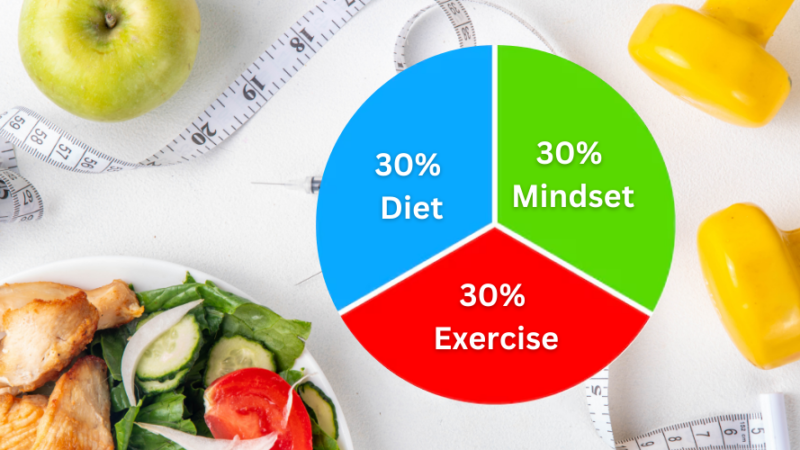9 Factors that Affect Metabolic Weight Loss

Losing weight is a frequent aim for many people, and understanding the factors that affect metabolic weight reduction will greatly enhance any weight loss effort. Although there isn’t a universal solution, there are several significant factors that influence how rapidly the body burns calories and sheds excess weight.
Metabolism is the chemical process by which your body converts food into energy. It consists of two processes: catabolism, which breaks down molecules to release energy, and anabolism, which uses energy to make new molecules. The rate at which your body burns calories when at rest is known as your basal metabolic rate, or BMR. To lose weight in a metabolically efficient manner, you must increase your BMR.
Understanding Basal Metabolic Rate (BMR)
Your BMR is determined by a variety of factors, such as your age, gender, body composition, and heredity. It’s a common misconception that having greater muscle mass lowers your body mass index (BMR). Because muscles require more energy to maintain than fat, having a higher muscle-to-fat ratio can increase your basal metabolic rate (BMR), which increases your calorie burning even when you’re at rest.
Investigating these 9 Factors that Affect Metabolic Weight reduction and making wise judgments might help you optimize your metabolism and accomplish your weight loss goals more successfully.
1. Age
As we age, our metabolism normally declines. The primary reasons of this are changes in hormone levels and a decrease in muscle mass. People in their twenties often have a higher metabolic rate than those in their forties or fifties. However, growing older is not a cause to give up on your ambition to lose weight. Regular exercise and eating a well-balanced diet rich in fruits, vegetables, lean proteins, and other nutrients can help to minimize the metabolic alterations brought on by aging.
2. Muscle Mass
One of the main factors affecting metabolic weight reduction is muscle mass. Because they require more energy to maintain than fat cells, muscles have a higher metabolic rate. Regular resistance training can improve muscle growth and increase your resting metabolic rate. Weightlifting and bodyweight exercises are two examples of these exercises. By including these workouts into your routine, you can lose weight and maintain it off in the long run.
3. Physical Activity
Physical activity level has a direct impact on metabolic weight loss. Beyond burning calories during the action, regular exercise increases caloric expenditure during rest. Exercises like swimming, cycling, or brisk walking that raise daily energy expenditure eventually lead to more obvious weight loss. If you find an exercise you enjoy and fit it into your daily schedule, it will be easier to stick to your fitness goals.

4. Diet
Our metabolism is largely influenced by the food we eat. Consuming a diet high in refined carbohydrates and added sugars can lead to weight gain and prevent metabolic weight loss. Instead, you should focus on eating a well-balanced diet that includes whole foods, lean proteins, fiber-rich carbohydrates, and healthy fats in order to maintain an efficient metabolism. By spacing out your meals and avoiding prolonged fasts, you can also keep a steady metabolic rate.
5. Sleep Quality
It’s amazing how sleep quality affects metabolic weight loss. If we get too little sleep or poor quality sleep, it can interfere with our metabolism. This could lead to changes in the hormones that regulate hunger, an increase in the demand for calorie-dense foods, and a slowdown in the pace at which calories are expended. By encouraging a healthier metabolic rate, sleeping on a regular schedule and creating a calm environment can support weight loss efforts.
6. Stress Levels
Because chronic stress makes our bodies release the hormone cortisol, which can increase hunger and lead to weight gain, particularly around the abdomen, it can have a detrimental effect on metabolic weight loss. Stress-reduction techniques that support a healthy metabolism include yoga, meditation, and taking up a hobby or lowering cortisol levels. It’s essential to plan time for relaxation and self-care if you want to lose weight as effectively as possible.
7. Hormonal Factors
Hormone imbalances can significantly affect weight loss through metabolism. Conditions like polycystic ovarian syndrome (PCOS) and underactive thyroid might slow down metabolism and make it more difficult to lose weight. If you believe that hormonal issues are hindering your weight loss efforts, it is imperative that you consult a healthcare professional. They might also recommend appropriate medications or lifestyle adjustments.
8. Genetics
Genetics may have an impact on our metabolic rate as well as how our bodies respond to different diets and levels of physical exercise. Some people naturally have a faster metabolism, which helps them burn calories more efficiently. We can optimize our weight loss with metabolic lifestyle modifications even though we have no control over our genes. Focusing on the aspects of our diet, exercise routine, and sleep that we can control may help us lose weight as much as possible.
9. Medications and Medical Conditions
Certain medications and medical conditions may have an effect on metabolic weight reduction. Numerous drugs, such as corticosteroids, antipsychotics, and some antidepressants, can either cause weight gain or make it more difficult to lose weight. Furthermore, the way our bodies metabolize and store fat may be affected by conditions like diabetes or insulin resistance. If you think that drugs or health problems are getting in the way of your weight loss attempts, you need to see a healthcare professional for guidance and treatment.
Give a look – Why am I Not Losing Weight?
Debunking Metabolic Weight Loss Misconceptions
There are several misconceptions surrounding metabolic weight loss. Let’s examine a few common myths and set the record straight.
Myth 1: You Inherit Your Metabolism
Your metabolic rate is not totally predetermined, even if heredity does play a part. The way you live and the habits you form can greatly influence your metabolism. By choosing to live a healthier lifestyle, you can maximize your metabolic rate and lose weight in a way that lasts.
Myth 2: Starvation Mode Boosts Weight Loss
Contrary to popular perception, cutting calories dramatically does not cause your body to lose weight by depriving it of vital nutrients. Rather, it may slow down your metabolism, which will make losing weight more difficult. A balanced diet is essential for maintaining general health and supporting your metabolism.
Myth 3: Certain Foods Can Speed Up Metabolism
Certain foods, like green tea and hot peppers, are frequently marketed as “metabolism boosters.” Even while these foods might not have much of an impact on your metabolism, they won’t make a big difference in terms of weight reduction. A balanced diet and consistent exercise are the keys to achieving a calorie deficit, which is necessary for metabolic weight loss.
Actionable Tips for Metabolic Weight Loss
Now that we have a better understanding of metabolic weight loss, let’s explore some practical tips to help you optimize your metabolism and achieve sustainable weight loss.
Tip 1: Strength Training for Muscle Building
Exercises for strength training should be a part of your fitness regimen. You can raise your resting metabolic rate (BMR) and burn more calories by gaining lean muscle mass. You can accomplish this by engaging in weightlifting, resistance training, or bodyweight activities.
Tip 2: High-Intensity Interval Training (HIIT)
Make high-intensity interval training a part of your training routine. HIIT consists of quick bursts of high-intensity training interspersed with active rest times. It has been demonstrated that this type of workout increases metabolism and burns more calories in less time.
Tip 3: Prioritize Quality Sleep
Make sure you get a good night’s sleep every night. Hormones that control appetite can be upset by sleep deprivation, which can boost food cravings and reduce metabolism. If you want to help yourself lose weight, try to get seven or nine hours of sleep per night.
Tip 4: Stay Hydrated
Staying properly hydrated is crucial to preserving ideal metabolic performance. Water consumption supports cellular functions, nutrition absorption, and digestion. For metabolic weight reduction and to stay hydrated, try to consume eight glasses or more of water each day.
Tip 5: Eat a Balanced Diet
A balanced diet consisting of a range of nutrient-dense foods should be your main priority. Include whole grains, fruits, vegetables, lean proteins, and healthy fats in your meals. Crash diets and extremely restrictive eating regimens should be avoided as they might have a detrimental effect on your metabolism and general health.
Conclusion
Numerous variables, all of which interact with one another, affect metabolic weight loss. We can improve our attempts to lose weight and speed up our metabolism by being aware of and taking action against these issues. Although each person’s weight reduction journey is different, you can still reach your objectives and enhance your general health by making thoughtful decisions and remaining dedicated.
Recommended – How to Lose Weight if You Have Hypothyroidism






